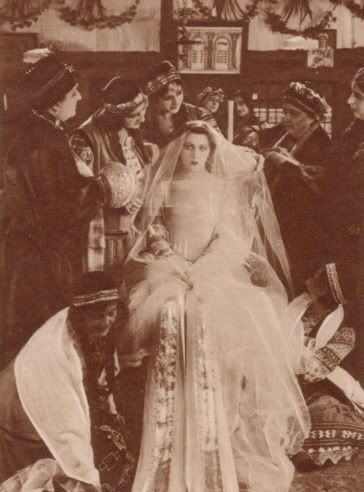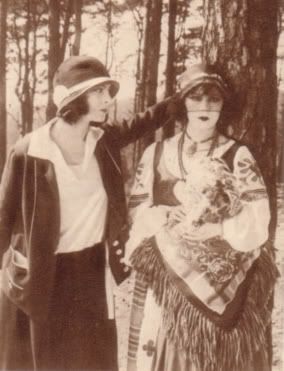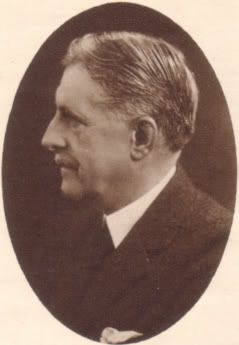 (Lia: Raquel Meller)
(Lia: Raquel Meller)La Terre Promise (The Promised Land, 1924) by Henry Roussel with Raquel Meller, Max Maxudian, Tina de Izarduy, Pierre Blanchar, Albert Bras and André Roanne
In Bessarabia [nowadays Moldavia], in the Jewish ghetto, the Sigoulim family is celebrating Jewish Easter. Samuel Sigoulim (A. Bras) is a devoted rabbi while his brother Moïse (M. Maxudian) is making a fortune as a money lender. Moïse becomes the king of petrol, following the discovery of oil in the area. He takes his two nieces, Lia (R. Meller) and Esther (T. de Izarduy) to live with him in London...
Henry Roussel was first an actor, then he became a director. But unlike many French directors of the 20s, he didn't adapt plays and novels. He wrote his own scripts. In doing so, he shows a vivid imagination, a real creativity in the subjects and also a talent for drama. So far, I had seen three of his pictures. Violettes Impériales (Imperial Violets, 1923) is a delightful story taking place during the Second Empire in France where a simple bouquet seller (Raquel Meller) becomes the darling of the Paris stage and a friend of the Empress Eugénie. L'Ile Enchantée (The Enchanted Isle, 1927), shot in Corsica, shows the conflict between tradition and progress. And La Valse de l'adieu (The Farewell Walz, 1928) is an interesting biopic of the life of Chopin (played by Pierre Blanchar). La Terre promise is focusing on a completely different subject. We are in Eastern Europe in the teens, in a region controlled by Russia. The Jews are in a ghetto and they are starving. Within the same family, several trends start to emerge. Samuel remains faithful to the tradition as a rabbi. He accepts poverty as fate. But his brother Moïse is fed up with the old traditions and decides he wants to have money and to be powerful. Among Moïse's children, we also see a division. David (P. Blanchar) is the rabbi's adopted son. He will become a rabbi like his elder. The two daughters Lia (R. Meller) and Esther (Tina de Izarduy, Raquel's sister in real-life) are also divided. While Lia remains faithful to her father's teaching, Esther loves luxury and wants to forget her past. So it's quite a shock for her to have to leave her life of luxury to follow her father back to the ghetto. Another conflict is brewing, both sisters are in love with the same man, a 'goy', son of an aristocrat. Henry Roussel took great care to avoid the usual prejudices in describing the life of the Jewish people. None are perfect. Samuel is so focused on his piety that he forgets that traditions can be stiffling. On the other hand, Moïse is so obsessed with money, he forgets where he is coming from and how his wealth can result in the poverty of his own folks. Roussel always builds up his stories with great care for details and characters. So, it's a real shame that La Terre Promise has reached us incomplete. About 40% of the footage is lost, mostly the beginning of the film. But, what remains shows a director sure of his craft in terms of drama, visual effects and atmosphere. He worked often with the wonderful Jules Kruger, who later worked on Gance's Napoléon and with L'Herbier on L'Argent. The film ends on an amazing climax as the oil field workers are rioting and setting the oil wells on fire. Roussel shows his ability in intimate scenes, such as the Jewish Easter celebrations, or in the crowd scenes. The Meller sisters are ideally cast as the Segoulim sisters. Tina, less famous than her sister Raquel, shows her metal as the jealous sister. There is a wonderful scene under heavy rainfall as Raquel's lover is leaving defeated and Tina literally throws herself at him. She really glows with passion and recklessness under the heavy downpour. I was also struck by the lovely scene of the Jewish Easter as the rabbi pours wine into a glass for the Prophet. He then asks his younger daughter Lia, then a child, to open the door symbolically for the Prophet. The child then sees a young boy all in white in the street: she instantly thinks it's Elijah! History repeats itself thirteen years later when Lia opens the door again and sees the same André (now a man) waiting for her. Great care has been done in recreating the interiors and the oil fields in a studio outside Paris. I can only hope that one day Henry Roussel will receive the praise he deserves. He was without a doubt one of the most gifted French directors of the 20s.


(Left: Tina and Raquel Meller; Right: Henry Roussel)
